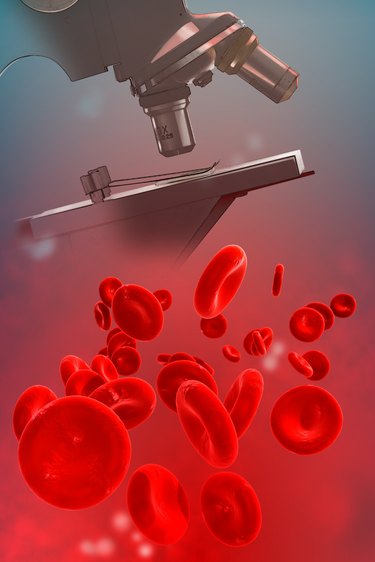
Anemia refers to a range of problems with your red blood cells. You may have heard it called "tired" blood because one of the major symptoms of anemia is fatigue. Your glucose, or blood sugar, can indirectly contribute to anemia in a few ways. One of the most common pathways is through your kidneys. Excessive glucose can clamp down on the production of a kidney hormone that triggers the production of red blood cells. If you're worried that you have anemia, talk with your health care provider about ways to treat and prevent the recurrence of the problem.
Anemia
Video of the Day
Although there are about 400 different types of anemia, the condition generally means you have a lower than normal number of healthy red blood cells, or you have a lower than normal amount of hemoglobin inside your red blood cells. Hemoglobin is a protein that helps deliver oxygen to the tissues within your body. About two-thirds of all the iron in your body is found in hemoglobin, making iron deficiency one of the major causes of anemia, according to the Cleveland Clinic. About one-third of the global population has iron-deficiency anemia.
Video of the Day
Glucose
Glucose is more commonly known as blood sugar. It is a major source of energy and fuel for your cells. Your body creates blood sugar after breaking down nutrients from some of your digested food. In blood tests, it's normal to get a reading up to 100 mg/dL of glucose, says MedlinePlus. Serious illnesses, including prediabetes and diabetes, are diagnosed when you have too much glucose in your blood. Too much glucose in your blood means not enough energy is being supplied to your cells. Complications of excessive glucose can impair the functioning of your heart and kidneys, nerves and eyes.
The Links
Problems with glucose do not cause anemia, but people who have diabetes tend to have a higher incidence of anemia than the general population, says the American Diabetes Association publication, "Diabetes Care." The links between glucose and anemia are complex. Diabetes can contribute to anemia through reducing absorption of iron, gastrointestinal bleeding and through diabetic complications that cause anemia. For example, too much blood sugar can lead to kidney and nerve damage, both of which can contribute to anemia. In diabetic kidney disease, the filtration mechanism of kidneys becomes disordered. Normally functioning kidneys secrete a hormone called erythropoietin, which stimulates your bone marrow to produce red blood cells. Excess glucose, such as in diabetes, reduces production of this hormone, causing anemia. Too much glucose can also damage the nerves that signal the kidneys to produce this hormone. In people with Type 1 diabetes, pernicious anemia is more common. Pernicious anemia is the inability to make enough red blood cells due to a vitamin B-12 deficiency.
Prevent and Treat Anemia
If you have an issue with glucose such as diabetes, your key to preventing anemia lies in controlling your blood sugar and blood pressure, says the Society for the Advancement of Blood Management. Good glucose control lowers your risk of developing kidney damage which in turn cuts your risk for anemia. Otherwise, treating anemia is based on the cause and severity of the condition. If an illness causes anemia, then treatment of the underlying illness usually resolves anemia. In addition, you may be able prevent and treat anemia by eating a diet rich in iron and vitamin B-12. In other cases, your doctor may recommend taking supplements or receiving injections to treat anemia. Talk to your doctor about your anemia concerns in general. Don't attempt to self-medicate as too much iron, whether from diet or from pills, can cause adverse health effects.
- "Diabetes Self-Management"; Ironing It Out: Linking Diabetes with Iron Intake; Amy Campbell; March 5, 2007
- "Diabetes Self-Management"; Pernicious Anemia; Nov. 23, 2009
- Cleveland Clinic: Anemia
- MedlinePlus: Glucose Test - Blood
- "Diabetes Care"; Anemia, Diabetes, and Chronic Kidney Disease; Uzma Mehdi and Robert D. Toto; July 2009
- Society for the Advancement of Blood Management; Recognizing Anemia in People with Diabetes; March 11, 2009
- American Diabetes Association: Anemia More Common Among Blacks With Diabetes
- "Diabetes Forecast"; Understanding Blood Sugar; June 2010
- CDC: Anemia or Iron Deficiency
Is this an emergency? If you are experiencing serious medical symptoms, please see the National Library of Medicine’s list of signs you need emergency medical attention or call 911.